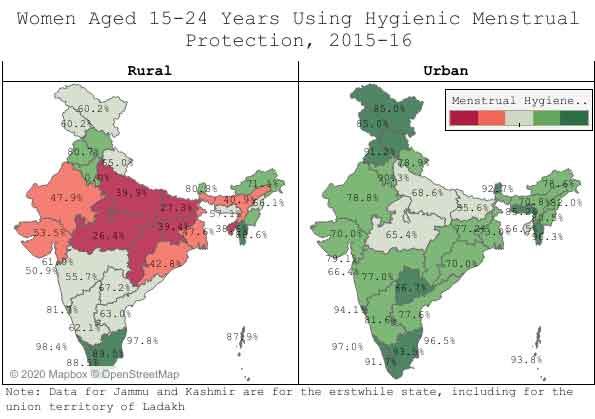
Three years ago, a tent had adorned my courtyard where a crowd had gathered. Someone was fighting off sleep, struggling to pay attention. Someone was wondering about the next cup of tea. Everyone was sitting in the tent’s light, smiling and chatting with each other, while I sat quietly in a dark corner of the terrace – away from everyone. While everyone worshipped the goddess right in front of me, I wondered about why I was made to sit aside. Why? Because I started my period that evening. While I had laboured with my family throughout the day for this festival, when it was time to worship, I was made to sit in a corner. The feeling of being cast aside by your own family, intensified when I saw everyone laughing and giggling together. I was bursting with a question – how fair is it to deliberately cast aside women while worshipping a goddess who has the same body and identity as them?
Most menstruators go through this experience at some point in their lives. Especially during festivals. Women, even when they are not on their periods have to deal with hard questions, whenever there is a festival around the corner – “If I get my period, who will do the domestic chores? How do I avoid touching a deity? What if I invite displeasure from God?” Every time a woman looks at the calendar, a list of countless and seemingly identical worries crop up in her mind. Whenever they are menstruating, women are made to opt out of any sort of involvement, restricted to touch things and asked to sit in a corner. This practice implies that menstruating women are impure.
Menstrual blood, and by extension, a menstruating woman is considered unholy or ‘Vital’ (disgusting) by society. If a woman in the house has her period, she is not only excluded but also treated as a secondary being. Women often end up taking period postponement pills to avoid being cast aside, especially during festivals.
According to a 2014 report by Dasra, a philanthropic organization, reveals that 71% of adolescent girls are unaware about menstruation before they hit menarche. When an adolescent girl menstruates, it is often an older lady in the house who commands younger girls – ‘you have grown up’, ‘don’t go there’, ‘don’t touch that’.
If anyone boldly asks the reason for this out of curiosity, they are unlikely to get an answer. In India, up to 70% mothers themselves pass on messages that indicate that menstrual blood is unclean. Therefore, at the age of normalizing menstruation, fear, hatred, and thoughts of impurity get reinforced instead. That’s why women usually try to avoid periods during the festival. They try to stay free and calm, opting for menstruation postponement pills.
Let’s see how menstruation postponement pills work. They contain Norethisterone, a synthetic type of Progesterone. There are two types of hormones in a female body (Estrogen and Progesterone). During the normal menstrual cycle, estrogon levels are elevated, lowering the progesterone. If there pregnancy does not occur, the lining formed in the uterus to nourish the foetus is released, leading to menstruation. Pills that postpone the menstrual date, raise the level of progesterone in the body creating a reverse lining of the uterine walls or further increasing the lining that is already formed. So, menstruation is interrupted or delayed.
Although this may seem straightforward, the consequences can be lifelong. If these pills are taken too often, menstrual irregularities may occur several days before or after the date. Even after menstruation, sudden spotting, anemia, irregularity in bleeding, sometimes even a small amount of bleeding takes place. The pills may be a temporary, perfect way to avoid menstruation but the side effects are certainly unavoidable. Fear of in-laws, helplessness, superstition, ignorance and the burden of traditions are reasons for women to opt for such drastic measure.
Menstruation is a private matter of a person. But since we do not accept menstruation as a natural process, it has elevated into a social problem. Customs, religious beliefs, caste, and social contexts directly affect menstrual practices. Menstruation is directly related to health and there is a need to create awareness that it is a natural process and respect it. The pills that are required today are self-acceptance, educating people around us and the confidence to break stereotypes and age-old practices; not the ones that postpone the menstruation!
The writer is from Maharashtra. Share your feedback on [email protected]
Charkha Features















































